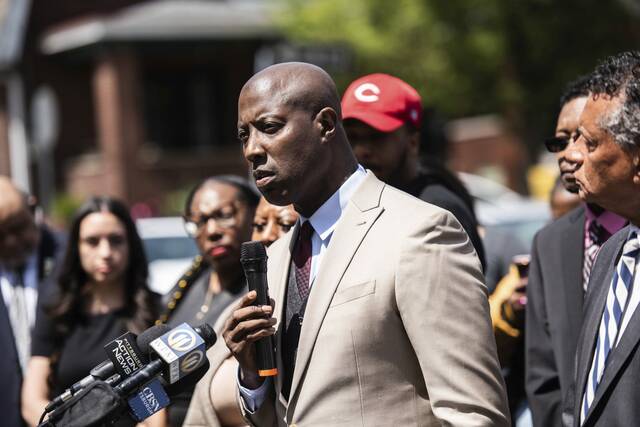https://triblive.com/local/family-of-man-who-died-after-being-shocked-by-taser-reaches-8m-settlement-with-pittsburgh/
Family of man who died after being shocked by Taser reaches $8M settlement with Pittsburgh

The family of a homeless man who died after being shocked with a Taser by Pittsburgh police at least 10 times in less than four minutes has reached an $8 million settlement with the City of Pittsburgh in its wrongful death lawsuit, an attorney said Thursday.
Jim Rogers, 54, died on Oct. 14, 2021, a day after being shocked with a Taser by police investigating a report of a stolen bicycle on Bloomfield’s leafy Harriet Street.
“Jim Rogers wasn’t welcome on this street … apparently, he didn’t fit in,” said the family’s attorney, Todd Hollis, as he spoke with reporters Thursday on Harriet Street.
“He was treated worse than any animal on this street,” Hollis said. “Mr. Rogers died after being accused of a crime that he never committed. Five hundred thousand volts of electricity … went through a 54-year-old man who wasn’t a threat to anybody.”
Hollis said the $8 million settlement is the most the city has ever paid out in a civil rights lawsuit.
The settlement also will seek to improve training and police policy related to all officers, Hollis said.
Hollis’ legal team shared its recommended policy changes with reporters. They included creating “a public database that includes information about every use of force incident in the city” and implementing policies where independent boards review all use-of-force incidents.
Police had been called to Harriet Street on Oct. 13, 2021, after a person reported that a man had taken a bicycle from a neighbor’s porch.
Rogers was shocked with the stun gun by Pittsburgh police Officer Keith Edmonds, the first officer to arrive on Harriet Street that day. A Pittsburgh police internal Critical Incident Review Board report obtained by the Tribune-Review said Edmonds deployed his Taser at least 10 times in 3 minutes and 15 seconds.
After Rogers was shocked by the stun gun, police handcuffed him and placed him in the back of a Pittsburgh police vehicle where he remained for 17 minutes. The report said he repeatedly asked for help, saying, “I need a hospital, I can’t breathe.”
EMTs called to the scene used saline solution to wipe Rogers’ blood off officers’ arms, but they did not check on Rogers, Hollis said.
Though West Penn Hospital is three blocks from Harriet Street, first responders drove Rogers past that hospital and UPMC Shadyside before taking Rogers to UPMC Mercy in Uptown. He became unresponsive on the way there.
Five Pittsburgh police officers were fired as a result of their actions leading up to the death of Rogers.
Some of those officers are pursuing reinstatement to Pittsburgh’s police force through arbitration, according to Hollis. He described that as “unacceptable.”
Eight officers were recommended for discipline following the incident involving Rogers. Three were reinstated.
Allegheny County District Attorney Stephen A. Zappala Jr. said in October that it was unclear whether the grand jury would issue a presentment recommending charges against any of the 13 police officers who were on the scene when Jim Rogers was shocked by the stun gun.
The grand jury convened without an indictment. To date, no arrests have been made in the case, Hollis said.
“People (on the grand jury) were not happy with the conduct they saw,” Zappala said at the time.
James Frierson, Rogers’ brother, said Thursday he wasn’t sure what he wanted to tell the officers who shocked Rogers with the stun gun or stood idle despite his cries for help.
“What is there to say?” Frierson said. “It was the most inhumane thing I’ve ever seen, even if he wasn’t my brother.”
“There’s never going to be closure,” he added. “We can’t unsee what we saw.”
Brandi Fisher, who heads the Pittsburgh-based group Alliance for Police Accountability, said “tough on crime” policies and people who advocate for the use of force against potential criminals continue to “strip us and each individual of our humanity.”
She called the Rogers case part of a battle against a law enforcement system in need of improvements.
“Without this type of fight … this type of justice does not come,” Fisher told reporters assembled on Harriet Street. “We cannot incarcerate our way out of all these issues.”
In a statement Thursday, Pittsburgh Mayor Ed Gainey said his heart was with Rogers’ family and friends.
“As we put his family’s lawsuit against the city behind us, the city continues to pray for the family over this unnecessary loss of life,” Gainey said. “I took office in the wake of the incident that took Jim Rogers’ life, and the investigation and disciplinary proceedings revealed a number of concerns in our Bureau of Police. While the prosecution of police officers is not in the city’s power, creating a Bureau rooted in community norms and civil rights is. So, we got to work.
“We’re seeking accountability, not just for those immediately implicated in police violence, but also for those in the chain of command who allow poor practices and violations of policy to persist. And, very soon, we’ll have a new chief of police to continue that accountability.”
Copyright ©2026— Trib Total Media, LLC (TribLIVE.com)
